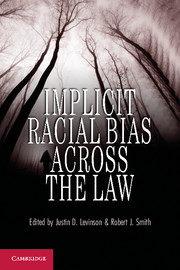Book contents
- Frontmatter
- Contents
- Contributors
- Acknowledgments
- Implicit Racial Bias Across the Law
- Introduction Racial Disparities, Social Science, and the Legal System
- 1 Implicit Racial Bias
- 2 Property Law
- 3 Criminal Law
- 4 Torts
- 5 Employment Law
- 6 Health Law
- 7 Education Law
- 8 Communications Law
- 9 Corporations Law
- 10 Tax Law
- 11 Intellectual Property
- 12 Environmental Law
- 13 Federal Indian Law
- 14 Capital Punishment
- 15 Reparations Law
- Index
- References
10 - Tax Law
Implicit Bias and the Earned Income Tax Credit
Published online by Cambridge University Press: 05 June 2012
- Frontmatter
- Contents
- Contributors
- Acknowledgments
- Implicit Racial Bias Across the Law
- Introduction Racial Disparities, Social Science, and the Legal System
- 1 Implicit Racial Bias
- 2 Property Law
- 3 Criminal Law
- 4 Torts
- 5 Employment Law
- 6 Health Law
- 7 Education Law
- 8 Communications Law
- 9 Corporations Law
- 10 Tax Law
- 11 Intellectual Property
- 12 Environmental Law
- 13 Federal Indian Law
- 14 Capital Punishment
- 15 Reparations Law
- Index
- References
Summary
The purpose of the earned income tax credit (EITC) is to eliminate tax-related incentives to remain on welfare. It operates by reimbursing low-income workers for income and Social Security tax withholdings that are not withheld from welfare payments. One persistent problem associated with the EITC is the large number of tax returns with EITC-related errors – referred to as the “error rate.” The inappropriate payments that flowed from the public treasury as a result of these errors are estimated at more than $10 billion for 2006 alone.
President Bill Clinton and the Republican Congress battled in the mid-1990s over the EITC's future. Republican President Gerald Ford signed the EITC into law in 1975 in part to reduce “the welfare rolls,” but it was the Republican Congress that wished to abolish the EITC and President Clinton who wanted to save it. The choice to reform or abolish the EITC depended on why the error rate occurred and how readily the problem could be redressed.
The first theory to explain the error rate is that, because of the EITC’s complexity, it is easy to make a mistake in calculating the credit. For instance, the Internal Revenue Service (IRS) informational booklet explaining the EITC is more than fifty pages long and includes several worksheets. The solution for the problem of complexity would be to simplify the EITC to reduce error rates. The second theory to explain the error rate is that it is the result of taxpayer fraud. Under this theory, taxpayers want something for nothing, so they cheat and claim an EITC amount that they know they are ineligible to receive. The solution to a problem based on fraud would be to increase audits of low-income taxpayers to crack down on the fraud.
- Type
- Chapter
- Information
- Implicit Racial Bias across the Law , pp. 164 - 178Publisher: Cambridge University PressPrint publication year: 2012



